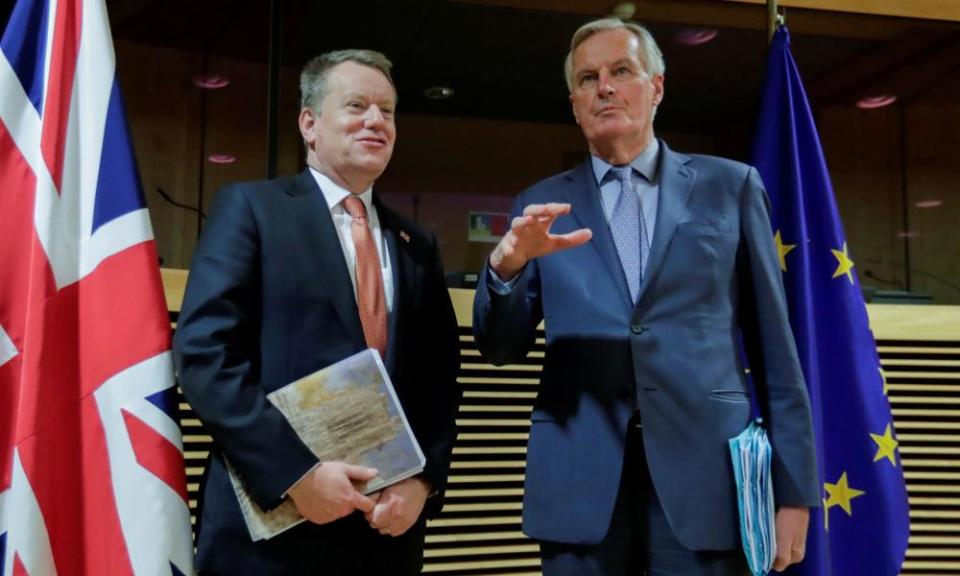What is happening in the Brexit talks?

Is this the final act in the negotiations?
Time has run out and both sides recognise that it is make or break for the trade and security negotiations with just three weeks to go before the UK leaves the EU’s single market and customs union. There is perhaps just 48 hours to go in the negotiations. The UK negotiating team led by David Frost is locked in the basement of the Department for Business, Innovation and Skills in Whitehall with Michel Barnier and the EU team. Arriving at the department on Friday, Barnier told reporters it was a “very important day”.
Will there be a deal?
Those in the negotiating room do not know. The UK team claimed on Thursday evening that the negotiation had taken a major step back because of new EU demands resulting from French lobbying.
The EU was said to have started pushing for further and harder assurances over the role of a UK regulator of subsidies, or state aid, a claim dismissed outright by Brussels. But sources concede that the issue remains difficult. The EU wants the domestic regulator to be given the power to approve or block subsidies based on shared EU-UK principles written in the treaty. A failure of the regulator to abide by the principles would give the EU the opportunity to unilaterally hit back through tariffs on British goods or even suspension of part of the trade deal.
France has said it will not tolerate a deal that provides a possible competitive advantage for UK businesses in the European market place. Clément Beaune, the French EU affairs minister, said Paris would be willing to veto the deal if necessary. The agreement will require unanimity among the 27 member states.
And the French are not alone in feeling nervous. Denmark, the Netherlands, Italy and Belgium are all concerned by the possibility that Barnier will concede too much to get the deal over the line. Meanwhile, Boris Johnson is repeating his mantra of being willing to leave the transition period on “Australian terms”, the Kafkaesque phrase he uses to describe a no-deal exit. Australia does not have a trade deal with the EU.
Is this just last-minute theatre?
Certainly one would expect a sudden burst of posturing from both sides as it comes to the decisive hours. A tough stance may just win that little extra ground in the negotiating room. A crisis could tee up an expected “political moment”: an arbitration involving the European commission president, Ursula von der Leyen, and Johnson. But there are real principles at stake. Germany has the rolling presidency of the EU and called on Barnier to address ambassadors in Brussels on Wednesday, as some European capitals were getting jittery about the lack of information on the most contentious parts of the deal: access to UK fishing waters and the maintenance of a level playing field through equivalent subsidy control regimes and standards over time. But it did not calm the nerves. Barnier was warned he was coming close, if not treading upon, the red lines of his negotiating mandate.
What happens now?
More talks through the weekend. It is expected that the moment of truth will come on Sunday evening or Monday morning. The internal market bill returns to the Commons on Monday. The government has said it will return the contentious clauses, taken out by the Lords, breaking international law by overriding clauses on the Northern Ireland protocol in the withdrawal agreement.
On Wednesday, the finance bill, breaking international law again by overriding further clauses in the treaty, is expected to be tabled. If the government goes ahead with these pieces of legislation it will show that all hope of securing a deal has gone. The EU has made it clear that it will not agree to a deal if Downing Street goes ahead with unilaterally rewriting the withdrawal agreement.

